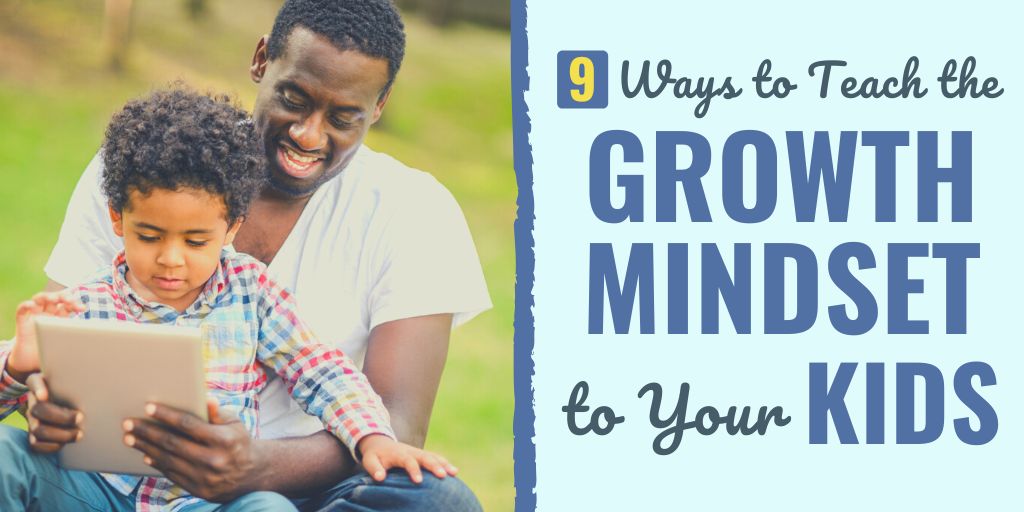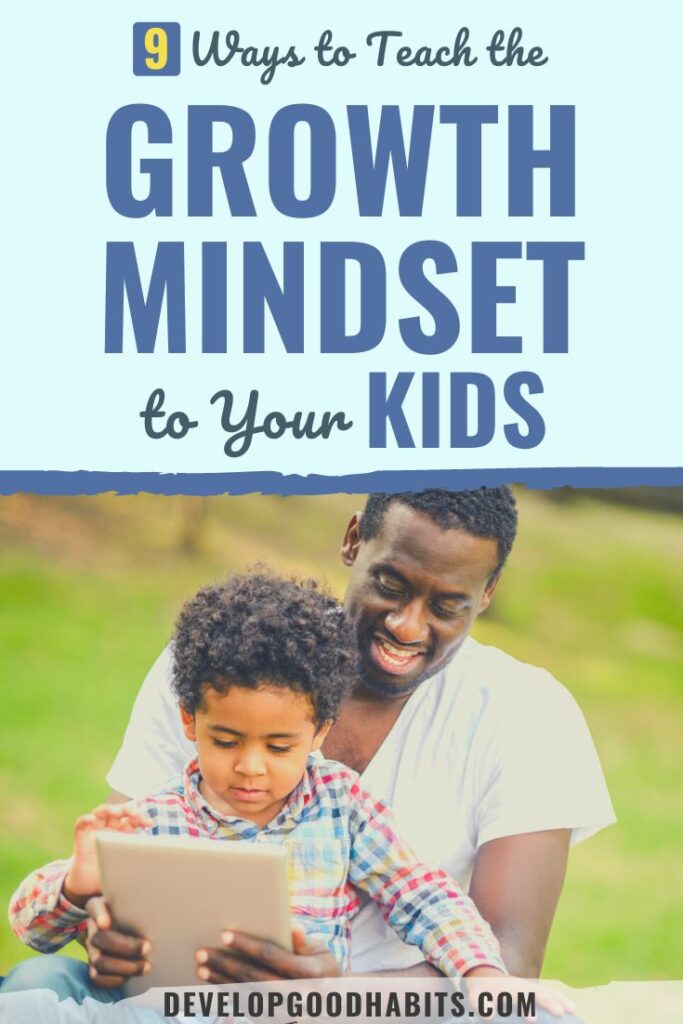Researchers believe there are two types of people in this world.
Type I is the person who believes we are born a certain way…with a certain level of intelligence, natural ability, and talent.
Type II believes that anything is possible and that, with effort, one can become more proficient and smarter.
The way you view yourself all boils down to mindset.
If you identify with Type I, you likely have what researchers call a fixed mindset.
Conversely, you have a growth mindset if you identify with Type II and believe in self-improvement.
People with a fixed mindset believe they cannot change. They also tend to think there is no room for improvement or growth.
However, people with a growth mindset believe they can improve themselves with time and experience… and that their efforts will directly impact their success.
The video below provides a quick overview of the growth mindset, how it can help you, and 11 actionable strategies for incorporating growth mindset into your life.
As an adult, you may feel it’s too late to change… but as a parent, the concept of a growth mindset for kids can still be taught.
And a growth mindset should be taught to kids. It can have an outsized impact on the rest of their lives.
Why Teach Children Growth Mindset
Many children are under so much pressure to be the best that they lose sight of the importance of self-worth and self-improvement.
If educators have classified a child as “gifted” at a young age… more times than not, these children will grow up feeling that they need to be on their game 24/7.
They often struggle with the impression of being born smart… so, naturally, everything should come easy for them. And that is not always the case.
Conversely, if a child is not deemed “gifted,”… is that to say they aren’t intelligent? Or can’t you become more innovative?
The same goes for athletically inclined children.
For some children, the ability to excel in sports comes naturally… but does that mean others cannot practice hard every day and improve their chances of making the team?
Preaching the growth mindset for kids to your children will not only take some of the pressure off that society places on them… but also shift their focus on the positive attributes they already possess.
This will ultimately lead to a greater self-esteem, a positive outlook on life, and a staunch work ethic.
Every child is different.
I am blessed to have four unique little humans proving that point daily.
Our first set the bar pretty high, stereotypically speaking.
He slept ok, about 4-6 hours at a time. He was also very calm and independent. Very aware. It's very in tune.
He walked early. Talked early. Read early.
The preschool teachers dubbed him gifted and said he should attend Kindergarten as soon as possible.
So we sent him.
He is now in fourth grade and has had no trouble academically.
Socially, however, he’s had some struggles with focus at times.
And, emotionally speaking, he can be hard on himself if he doesn’t do perfectly on a test or excel in a particular area.
When his sister was born, we immediately noticed differences in their personalities.
She was sleeping 10+ hours a night almost from the start. She was a voracious eater. And she was also much fiercer and more independent… learning to walk one month sooner than him.
Reading didn’t come as naturally for her as it did for our son. But, with a lot of hard work and practice with her dad over the summer, she still managed to be able to read on her own within the first two months of Kindergarten… ahead of many of her peers.
To this day, she is a hard worker and considered a model student by her second-grade teacher.
Our third and fourth children are still young, ages 5 and 6… but they are starting to find their way. The six-year-old struggles with reading and writing a bit more than her siblings. We suspect she may have a slight learning disability and are working to have her assessed.
Our five-year-old is considered extremely intelligent and academically capable of skipping a grade… although the maturity level is not quite there.
So why did I share all of this?
Establishing a growth mindset for kids may be more challenging for some.
My family is living proof.
That being said, it absolutely can be taught.
In this article, I will identify nine strategies you can implement to help your children develop a growth mindset.
How to Teach Your Child the Growth Mindset
Strategy #1: Acknowledge Their Strengths
My husband and I apply this strategy daily with each of our kids, continuously acknowledging their strengths.
Our oldest son, now 9 years old, likely suffers from a fixed mindset… at least to some degree. I take part of the blame, as he was our first… and the first child typically sets a standard of expectations for the rest, for better or worse.
When we were told how smart he was, we rolled with it. We sent him to kindergarten early… never stopping to think about the emotional or psychological fallout it could have later on.
So when he gets down on himself about struggling in some areas or not being the tallest kid in class, we play up his strengths.
We remind him of how good he is in math and science.
How creative he is, writing and drawing his comics… or creating his own board game. (Learn the benefits of creative writing for children.)
How he earned his black belt in taekwondo before turning ten years old.
What an excellent soccer player, displaying positional awareness that almost can’t be taught.
We tell him he is handsome and kind… and funny.
By redirecting the focus on his positive attributes, we are hoping to gradually shift his way of thinking to one of a growth mindset. To make him believe that anything is possible with hard work and the desire to succeed.
As for our 6-year-old daughter, who is struggling with reading (we suspect dyslexia)… she is a fantastic artist.
With art, there is no right or wrong. It’s purely about expression. Art appears to be her outlet for when she’s frustrated.
So to acknowledge that strength and talent, we’ve started hanging her best pieces. It makes her feel incredibly proud rather than ashamed of what she isn’t great at.

Strategy #2: Be the Example
As a parent, it may feel like you sometimes talk to the wall. (Though it doesn't always have to be. There are conversation starters for kids you can use.)
Sadly, you are.
Let’s face it: kids are kids. They are often easily distracted… and, quite frankly, don’t care what you have to say at times.
But that doesn’t mean they aren’t watching you.
Whether you realize it or not, you are a role model for your kids. Your actions are not lost on them.
So, if you give up easily or are afraid to try new things… what do you think they will do?
This winter, we took the kids to a ski resort… and got them snowboarding lessons.
I signed up as well.
Why?
Well, for one, I do not want to sit back in the lodge while my family is out having fun.
Second, I had never done it and wanted to show the kids that trying something new was never too late.
So… the kids and I took our lessons and fell—a lot.
I had such a bad fall once I thought I had dislocated my shoulder.
But the kids were watching… so I got back up and went down again. I taught them not to be afraid.
I lead by example.
And by the end of the day, I was going down the blue slopes.
Since that moment, the kids have been hooked, asking when we can go again.
They now know that falling is part of the learning process and will eventually fall less… until they are good.
Had I given up, they likely would have, too.
(To understand yourself better when relating to your kids, check out these parenting style quizzes.)
Strategy #3: Outline Realistic Goals
Often one of the most common mistakes people make in life is setting unrealistic goals for themselves.
By doing so, you are just setting yourself up for failure.
Creating a list of tangible goals is an important step in teaching children a growth mindset.
For instance, if your tween feels inadequate because he doesn’t have the stamina to run a 5K with his best friend… why not sit down with him and devise a training plan filled with tangible goals?
Start by working up to running one mile without stopping.
Then work up to two miles, mixing in running and walking at a brisk pace… etc.
Celebrate each goal as it’s accomplished… focusing on the short-term victories rather than just the long-term goal.
It will give your kid just the confidence boost he needs to succeed!
You can even get your kids involved in goal setting. Check out these SMART goal examples specific to kids.
Strategy #4: Praise Generally, Not Specifically
As parents… heck, as people… we are hardwired to make a big deal out of being the best.
But what if you generalize your praise rather than make it all about specific results?
Here’s what I mean…
Instead of looking at your child’s report card and congratulating her on getting all A’s and B’s… try acknowledging the hard work they put into the semester to get those grades.
The commonly used phrase, “A for effort,” does carry some weight when it comes to fostering a growth mindset in children.
By switching the focus from results to effort, you instill in them the importance of working hard to get what you want.
If you want specific examples, here's our post on growth mindset phrases to encourage children.
Strategy #5: Ignite Trial by Fire
Perhaps you have a timid kid?
One who is so stricken with fear over failing or not being the best at something that they are hesitant to try anything new.
This is unhealthy.
It is also a surefire way of slipping back into or becoming trapped in a fixed mindset.
You know, the one where you don’t believe in self-improvement because “you are who you are”.
Watch the following video for more examples of a fixed mindset vs. a growth mindset so you can identify them immediately.
But anyone who preaches a growth mindset knows that practice makes perfect and that you, and only you, can improve any situation.
That you are capable of putting in the work to see results.
If your child seems interested in playing basketball, sign them up for a recreation league.
Don’t give them a choice in the matter. Instead, reassure them that there is no failure in trying… and how brave they are for doing so. Lend your support.
They'll know if basketball isn’t for them and move on to something else.
If they enjoy it, they can only get better with time.
Whatever their choice, you’ve taught them not to let fear disrupt a potential path to success.
Strategy #6: View Failure as an Opportunity for Growth
Practicing the growth mindset is very much about resilience.
It would be best to teach your children from an early age that mistakes are part of the learning process.
So rather than beating themselves up or quitting over a mistake… they need to view it as an opportunity to grow and change. To work harder.
Discuss the mistakes together.
Share some of your mistakes with them… something they can relate to, which may help them feel less bad about themselves.
You may even want to search for someone famous they admire on Wikipedia, which provides a neatly outlined bio on who they were before they made history. They may be surprised at the hiccups we all face regarding where we are meant to be.
However you choose to tackle it, assure them that mistakes are a part of life… and necessary to appreciate what we earn.

Strategy #7: Do Not Tolerate Self-Bashing Behaviors
Self-flagellation is all too common among young kids.
I’ve heard my children, who are 5, 6, 8, and 9 years old, refer to themselves as “dumb” or “stupid” more times than I can count.
Where do they get it from?
My husband and I certainly don’t use those words to describe them. We try not to use those words at all.
Do they hear it on television?
Are other children calling them names?
Regardless of where the fact that they think of themselves in that way should not be tolerated at home. So if you hear your child negatively refer to themselves, nip it in the bud immediately.
Tell them you highly disagree and quickly jot down three or more positive adjectives you’d use to describe them instead.
Next, have them write down three or more things they like about themselves.
Please have your child keep both lists as a reminder the next time they feel inadequate.
Helping them develop a writing habit will allow them to express themselves better. One way to nurture this is to encourage them to start a journaling habit. Here are some great journal prompts for kids.
Have your kids regularly recite positive affirmations to help remind them of their strengths.
Is your child a visual learner? Here's a roundup of our favorite growth mindset videos that kids can watch on YouTube.
Strategy #8: Dismiss the Competition
Raise your hand if your child has come home from school complaining about how someone is better than them at something.
Sarah got an award from the Principal for her essay.
David medaled at the track meet today.
The best way to handle this is to dismiss the comment. Play it down.
Phrases like, “Good for him (or her)!” or “That’s nice.”, are good starts.
Even better yet is to dismiss the comment and immediately follow up with a compliment to your child. That or something you’re proud of them for.
Something like this…
“Good for her, honey. Hey, did I mention that Mrs. Johnson next door told me how kind you were for bringing in her trash cans this morning? That was so great of you! You’re such a nice kid.”.
In a very subtle way, you’ve successfully switched your child’s focus from the person they are jealous of… back onto them.
Strategy #9: Preach the Idea of Constructive Criticism
When your child receives criticism, albeit constructive, from a mentor (i.e., parent, teacher, tutor, or coach)… their initial reaction is likely to view it as negative.
Your mission, should you accept it, is to convert the stigma of criticism as a negative into a positive.
How, you ask?
For starters, try replacing the phrase “constructive criticism” with the word “advice.”

Explain to them that someone giving instructions on improving themselves should be viewed as helpful, not derogatory.
Another exercise you could implore is having your child create a list of things they want to improve upon… and show it to whichever adult works with them on that task.
This way, the “advice” comes from themselves rather than another person… which may prove to be an easier pill to swallow.
Nobody likes having their shortcomings pointed out to them, but if you can retrain how a child’s brain views this constructive criticism… it will likely go a long way in strengthening their growth mindset.
Final Thoughts on How to Teach Growth Mindset to Kids
Teaching the concept of a growth mindset for kids isn’t all that different from exercising positive reinforcement and self-awareness strategies with your child.
At the very core, every child needs to feel as if they are “good enough”.
They need continual encouragement and support from those around them, especially their parents or caregivers.
A child’s self-esteem is often built around hope. I hope that they can do anything they set their mind to.
They can do better in school.
They can do better at sports.
They can make new friends.
They can try new things.
They can succeed.
If you teach your child from an early age that there is always a chance to improve themselves, to meet and exceed their goals in life… then they will.
They will believe it. They will achieve it.
It’s as simple as that.
Conversely, if you let them become complacent and comfortable with who they are, they will never strive to be anything more. They will be lost in a fixed mindset, which is much harder to unlearn as they age.
Not impossible, but difficult.
So, as my last advice, I offer this… check yourself. Test your mindset.
Which one are you?
If you already have a growth mindset, teaching it to your child should be a piece of cake… especially if you incorporate the nine strategies outlined here.
If you are of a fixed mindset… correct yourself first. Break the cycle. (This article about how to be more patient with kids is also helpful in your journey.)
Then you can get to work on your child. You can start by reading with them books about growth mindset or getting them growth mindset-themed coloring pages.
It’s never too late for either of you to learn the growth mindset… and I guarantee you’ll both feel like a weight has been lifted once you do!
You can reinforce teaching your kids a growth mindset by setting sensible house rules that will help them become well-rounded adults.
Learn more about the power of a growth mindset:
- 9 Growth Mindset Worksheets and Templates
- 27 Habits to Develop the Growth Mindset in Your Life
- 25 Growth Mindset Posters to Inspire Kids and Students
- 9 Fixed Mindset VS Growth Mindset Real-World Examples
- 55 Growth Mindset Journal Prompts for Students and Adults
Finally, if you want to level up your parenting skills, then check out this resource that will show you how to get your kids to listen WITHOUT yelling, nagging, or losing control.

Nicole Krause has been writing both personally and professionally for over 20 years. She holds a dual B.A. in English and Film Studies. Her work has appeared in some of the country’s top publications, major news outlets, online publications, and blogs. As a happily married (and extremely busy) mother of four… her articles primarily focus on parenting, marriage, family, finance, organization, and product reviews.


